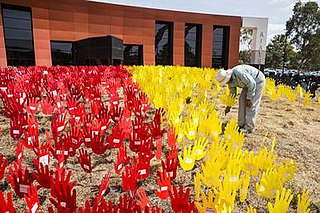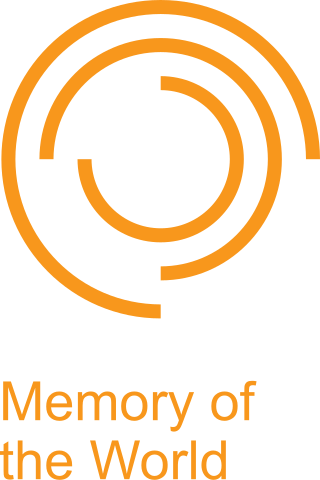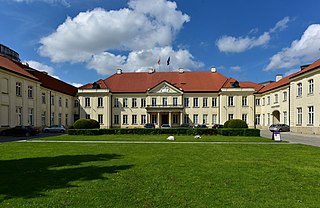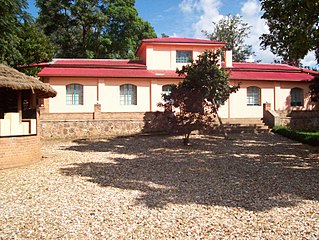
The culture of Ukraine is composed of the material and spiritual values of the Ukrainian people that has formed throughout the history of Ukraine. Strong family values and religion, alongside the traditions of Ukrainian embroidery and folk music are integral aspects of the country's culture. It is closely intertwined with ethnic studies about ethnic Ukrainians and Ukrainian historiography which is focused on the history of Kyiv and the region around it.
The Department of Canadian Heritage, or simply Canadian Heritage, is the department of the Government of Canada that has roles and responsibilities related to initiatives that promote and support "Canadian identity and values, cultural development, and heritage."

The Rwanda Defence Force is the military of the Republic of Rwanda. The country's armed forces were originally known as the Rwandan Armed Forces (FAR), but following the Rwandan Civil War of 1990–1994 and the Rwandan genocide of 1994 against the Tutsi, the victorious Rwandan Patriotic Front (Inkotanyi) created a new organization and named it the Rwandan Patriotic Army (RPA). Later, it was renamed to its current name.

The Australian Institute of Aboriginal and Torres Strait Islander Studies (AIATSIS), established as the Australian Institute of Aboriginal Studies (AIAS) in 1964, is an independent Australian Government statutory authority. It is a collecting, publishing, and research institute and is considered to be Australia's premier resource for information about the cultures and societies of Aboriginal and Torres Strait Islander peoples.

UNESCO's Memory of the World (MoW) Programme is an international initiative launched to safeguard the documentary heritage of humanity against collective amnesia, neglect, decay over time and climatic conditions, as well as deliberate destruction. It calls for the preservation of valuable archival holdings, library collections, and private individual compendia all over the world for posterity, the reconstitution of dispersed or displaced documentary heritage, and increased accessibility to, and dissemination of, these items.

The Chamber of Deputies is the lower house of the bicameral national legislature of Rwanda. It was created under the new Constitution adopted by referendum in 2003.

The upper house of the Parliament of Rwanda is the Senate (Sena/Sénat). The Senate has 26 members elected or appointed for eight-year terms: 12 elected by provincial councils, eight appointed by the President of the Republic to ensure the representation of historically marginalized communities, four by the National Consultative Forum of Political Organizations, and two elected by the staff of the universities. Additionally, former presidents can request to become a member of the Senate.

The Institute of Museum and Library Services (IMLS) is an independent agency of the United States federal government established in 1996. It is the main source of federal support for libraries and museums within the United States, having the mission to advance, support, and empower America’s museums, libraries, and related organizations through grantmaking, research, and policy development.” In fiscal year 2023, IMLS had a budget of $313.58 million. As of 2023, IMLS currently has 70 full-time employees, many of whom still work remotely. In 2022, the employees voted to unionize, joining hundreds of thousands of federal workers who have joined the American Federation of Government Employees (AFGE) to “build power and have a voice at work.”

The Ministry of Culture and National Heritage is a ministry within Polish government led by the Minister of Culture and National Heritage responsible for national heritage preservation and Polish culture promotion. Ministry oversees state or partially state cultural institutions and implements the law regarding art and cultural property. Ministry headquarters are located at Potocki Palace, 15 Krakowskie Przedmieście Street in Warsaw. Incumbent minister has been Hanna Wróblewska member of the Cabinet) since May 2024

Saudi Arabia is the second biggest tourist destination in the Middle East with over 16 million visiting in 2017. Although most tourism in Saudi Arabia still largely involves religious pilgrimages, there is growth in the leisure tourism sector. As the tourism sector has been largely boosted lately, the sector is expected to a significant industry for Saudi Arabia, reducing its dependence on oil revenues. This is proved as tourism sector is expected to generate $25 billion in 2019. Potential tourist areas include the Hijaz and Sarawat Mountains, Red Sea diving and a number of ancient ruins.

The Kandt House Museum, formerly known as the Natural History Museum, is located in what is now the city of Kigali, Nyarugenge District, westbound. This location was chosen as the colonial capital in Rwanda of Germany in 1907 by a German resident (Administrator) Richard Kandt under the name of Nyarugenge.The name was changed to Kigali in 1908 because it was too difficult for the colonialists to pronounce. But the name Kigali was named by King Cyirima I Rugwe in the 14th century by naming now known as Mount Kigali.

The Museum of Polish History or the Polish History Museum is a museum and national cultural institute in Warsaw, Poland. The purpose of the museum is to present the most important events in Polish history, with a particular emphasis on Polish traditions of freedom. Since September 2023, the new museum building has been located in the Warsaw Citadel.

The arts and culture of Maryland are varied; they are not just limited to metropolitan areas, but can also be experienced throughout the state. There is an eclectic mix of southern and northern American cultures influenced by its foundation as a Catholic colony.
Various television networks, newspapers, and radio stations operate within Rwanda. These forms of mass media serve the Rwandan community by disseminating necessary information among the general public. They are regulated by the self-regulatory body.

The Ministry of Culture and Tourism of the People's Republic of China (中华人民共和国文化和旅游部) is a constitute department of the State Council of the People's Republic of China in charge of culture and tourism.
The Institute of National Museums of Rwanda (INMRB) was a governmental organization in Rwanda. It was merged into the Rwanda Cultural Heritage Academy in 2020.
The Campaign Against Genocide Museum is one of the eight museums managed by the Rwanda Cultural Heritage Academy. It is housed in the Parliamentary building of Rwanda and was inaugurated in 2017 by Paul Kagame with an aim to showcase the history of Rwanda during the campaign against the genocide against the Tutsi.
Sudan Memory is an online archive and cultural heritage project, provided by an international group of partners with the aim of conserving and promoting Sudanese cultural heritage. In the course of the project, digital reproductions of books and newspapers, photographs and films, visual art and architecture, as well as of other cultural objects in Sudan were created and published on the project's website.












